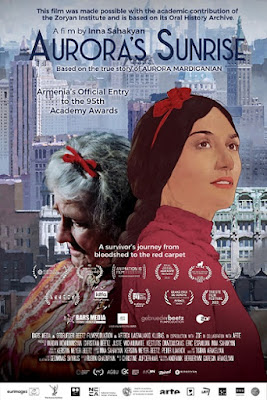Imagine if all prints of Hotel Rwanda or Schindler’s List disappeared a few years after they premiered. That is basically what happened to Auction of Souls, a widely seen 1919 silent film about the Armenian Genocide, starring Aurora Mardiganian, a genocide survivor, portraying herself. Sadly, Auction of Souls is still considered a “lost film,” but some rediscovered fragments have been incorporated into Inna Sahakyan’s animated “documentary,” Aurora’s Sunrise, which opens today in New York.
A friendly Kurdish shepherd warned Mardiganian’s father the Ottoman regime was rounding-up ethnic Armenians, but he simply could not envision the horrors that were coming. Some of the men were drafted into military service, but the rest of the Armenian enclaves were forcibly expelled in brutal death marches. After witnessing the deaths of her mother and sisters, Mardiganian was several times sold into sexual slavery (sometimes referred to with inappropriate romanticism as harems). Yet, she kept escaping, hoping to reunite with her surviving family.
Eventually, an uncle with the Armenian resistance arranged Mardiganian’s passage to America. Despite her youth, she became a spokesperson for the Armenian cause, even reliving the horrors she endured in Auction of Souls, the movie adaptation of her serialized biography.
It is important to remember Mardiganian and the roadshow screenings of Auction of Souls raised over $116 million dollars for Armenian orphan relief, which when accounting for inflation amounts to over $1.7 billion in current dollars. There was widespread outrage across America regarding the Armenian genocide, which is why the Roosevelt administration’s stony silence on the Holocaust is so hard to accept.
Regardless, Aurora’s Sunrise bills itself as documentary, but the story unfolds like a narrative film. From time to time, Sahakyan includes archival interview footage with the late Mardiganian, but the film plays out like an epic historical. Mardiganian’s many escapes might even have a “Perils of Pauline” vibe were it not for the dire circumstances and tragic context in which they take place.








